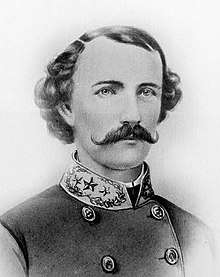Thomas James Churchill
Thomas James Churchill (March 10, 1824 – May 14, 1905) was an American politician who served as the 13th governor of Arkansas from 1881 to 1883. Prior to that, he was a senior officer of the Confederate States Army who commanded infantry in the Western and Trans-Mississippi theaters of the American Civil War.
Thomas James Churchill | |
|---|---|
 Churchill in uniform, ca. 1862 | |
| 13th Governor of Arkansas | |
| In office January 13, 1881 – January 13, 1883 | |
| Preceded by | William R. Miller |
| Succeeded by | James H. Berry |
| 16th Treasurer of Arkansas | |
| In office November 12, 1874 – January 12, 1881 | |
| Governor | Augustus H. Garland William R. Miller |
| Preceded by | Robert C. Newton |
| Succeeded by | William E. Woodruff, Jr. |
| 14th Postmaster of Little Rock | |
| In office September 11, 1857 – March 27, 1861 | |
| Nominated by | James Buchanan |
| Preceded by | John E. Reardon |
| Succeeded by | William F. Pope |
| Personal details | |
| Born | March 10, 1824 Louisville, Kentucky, U.S. |
| Died | May 14, 1905 (aged 81) Little Rock, Arkansas, U.S. |
| Resting place | Mount Holly Cemetery, Little Rock, Arkansas, U.S. 34°44′15.3″N 92°16′42.5″W |
| Political party | Democratic |
| Spouse(s) | Anna M. Sevier (m. 1849) |
| Relations | Ambrose H. Sevier (father-in-law) |
| Children | 5 |
| Military service | |
| Allegiance | |
| Branch/service | United States Volunteers |
| Years of service | 1846–1847 (USV) 1861–1865 (CSA) |
| Rank | |
| Unit | 1st Kentucky Cavalry |
| Commands |
|
| Battles/wars | Mexican–American War (POW) American Civil War |
Early life and education
Thomas James Churchill was born near Louisville, Kentucky.[lower-alpha 1] He graduated from St. Mary's College in Bardstown in 1844, then studied law at Transylvania University in Lexington. He served during the Mexican War, rising to the rank of first lieutenant in the 1st Kentucky Mounted Rifles. He was captured by the Mexicans and remained a prisoner of war until near the end of that conflict. In 1848, he moved to Little Rock, Arkansas, married the daughter of United States Senator Ambrose H. Sevier, and became a planter. Appointed by President James Buchanan, he served as postmaster from September 1857 to March 1861.[1]
American Civil War
At the start of the Civil War, Churchill offered his services to the state and was elected colonel of the 1st Arkansas Mounted Rifles. His first combat took place at the Battle of Wilson's Creek near Springfield, Missouri. On March 4, 1862, he was promoted to brigadier-general and soon thereafter took part in Maj. Gen. Kirby Smith's Kentucky Campaign. Churchill played an important role in the victory at Richmond, Kentucky, commanding a division of men from Texas and Arkansas. Leading his division along a ravine that became known as "Churchill's Draw" he delivered a successful and surprising flanking attack. On February 17, 1864, Churchill was cited as one of three officers to receive special recognition in a Thanks of Confederate Congress resolution for his actions at Richmond.[2]
In the latter part of 1862, Churchill was transferred back to Arkansas and placed in charge of the fortifications at Arkansas Post. In January 1863, the Post was attacked and seized in the Battle of Fort Hindman by an overwhelming Union force under Maj. Gen. John A. McClernand. After his exchange Churchill continued his service in the Trans-Mississippi Department and commanded a division during the Red River Campaign. He played a major role in the Battle of Jenkins Ferry and was promoted to major-general on March 17, 1865.[2]
Later life
Churchill was elected Treasurer of Arkansas in 1873. He was subsequently re-elected in 1875, 1877, and 1879. During the Brooks–Baxter War of 1874, Churchill supported Elisha Baxter and helped enroll volunteers in Baxter's militia. Elected governor of Arkansas in 1880, Churchill served until 1883.[3] While governor, he was plagued by allegations of discrepancies in the treasurer's account from when he served as state treasurer. A special committee found a shortage in the state funds, and a lawsuit was brought against him. He was ordered to repay the missing funds.[4] Churchill died in Little Rock and was buried in historic Mount Holly Cemetery with military honors.
See also
- List of Confederate States Army generals
- List of Governors of Arkansas
- List of members of the United Confederate Veterans
- The Family (Arkansas politics)
Notes
- His older sister was Abigail Prather Churchill (1817-1852), wife of Meriwether Lewis Clark Sr. (1809-1881).
References
- "Postmaster Finder". United States Postal Service. Retrieved May 27, 2019.
- Eicher, John H.; Eicher, David J. (2001). Civil War High Commands. Foreword by John Y. Simon. Stanford: Stanford University Press. p. 173. ISBN 978-0-8047-3641-1. OCLC 928433486. OL 6210070W.
- Hodges, Earle W. (1913). Arkansas Biennial Report of the Secretary of State. Little Rock: Tunnah & Pittard. pp. 104, 106.
- "Thomas James Churchill (1824–1905)". Encyclopedia of Arkansas. Retrieved May 30, 2019.
External links
| Wikimedia Commons has media related to Thomas James Churchill. |
- Thomas James Churchill at Find a Grave
- Thomas James Churchill at The Historical Marker Database (HMdb.org)
- Thomas James Churchill at the National Governors Association
- Thomas James Churchill at The Political Graveyard
- Works by or about Thomas James Churchill at Internet Archive
- Works by or about Thomas James Churchill in libraries (WorldCat catalog)
